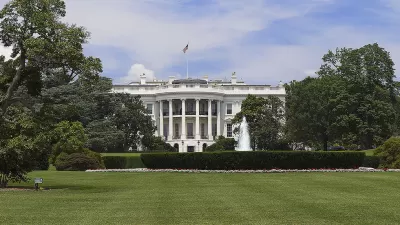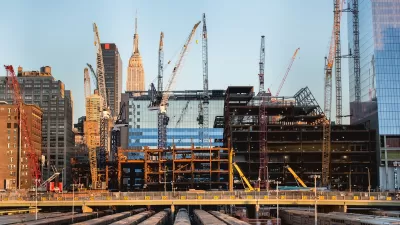The proposed budget seeks to expand the housing voucher program, incentivize housing production, and promote zoning reform, but will likely face strong opposition from congressional Republicans.

The proposed budget released by the White House on Thursday includes over $175 billion in investments directed at increasing the nation’s housing supply and alleviating the affordability crisis.
As Michael Brady explains in Smart Cities Dive, “The budget proposal includes $59 billion in mandatory funding and tax incentives to increase the affordable housing supply and $10 billion in mandatory funding to create incentives for state and local governments to eliminate barriers to affordable housing such as restrictive zoning.”
The proposal includes a neighborhood homes tax credit, which “would cover the gap between the construction costs and the sale price for rehabilitated or newly constructed single-family homes in low-income communities,” as well as an expansion of the low-income housing tax credit, rental assistance, among other incentives and subsidies. The budget also proposes an expansion of the Housing Choice Voucher program, voucher guarantees for vulnerable groups, and funding for eviction prevention efforts.
Brady notes that “Congress is unlikely to pass the president’s budget as written, with the White House engaged in a pitched battle with congressional Republicans over spending priorities and the debt ceiling.” Meanwhile, a budget outline being considered by congressional Republicans would cut 43 percent from housing programs and paves the way for eliminating the Housing Choice Voucher program.
FULL STORY: More than $175B in housing investments in Biden budget proposal

Alabama: Trump Terminates Settlements for Black Communities Harmed By Raw Sewage
Trump deemed the landmark civil rights agreement “illegal DEI and environmental justice policy.”

Planetizen Federal Action Tracker
A weekly monitor of how Trump’s orders and actions are impacting planners and planning in America.

Why Should We Subsidize Public Transportation?
Many public transit agencies face financial stress due to rising costs, declining fare revenue, and declining subsidies. Transit advocates must provide a strong business case for increasing public transit funding.

Understanding Road Diets
An explainer from Momentum highlights the advantages of reducing vehicle lanes in favor of more bike, transit, and pedestrian infrastructure.

New California Law Regulates Warehouse Pollution
A new law tightens building and emissions regulations for large distribution warehouses to mitigate air pollution and traffic in surrounding communities.

Phoenix Announces Opening Date for Light Rail Extension
The South Central extension will connect South Phoenix to downtown and other major hubs starting on June 7.
Urban Design for Planners 1: Software Tools
This six-course series explores essential urban design concepts using open source software and equips planners with the tools they need to participate fully in the urban design process.
Planning for Universal Design
Learn the tools for implementing Universal Design in planning regulations.
Caltrans
Smith Gee Studio
Institute for Housing and Urban Development Studies (IHS)
City of Grandview
Harvard GSD Executive Education
Toledo-Lucas County Plan Commissions
Salt Lake City
NYU Wagner Graduate School of Public Service





























